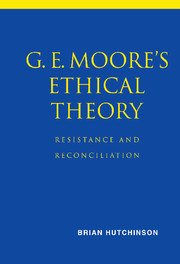Book contents
- Frontmatter
- Contents
- Introduction: Irony, Naïveté, and Moore
- 1 Simplicity, Indefinability, Nonnaturalness
- 2 Good's Nonnaturalness
- 3 The Paradox of Ethics and Its Resolution
- 4 The Status of Ethics: Dimming the Future and Brightening the Past
- 5 The Origin of the Awareness of Good and the Theory of Common Sense
- 6 Moore's Argument Against Egoism
- 7 The Diagnosis of Egoism and the Consequences of Its Rejection
- 8 Moore's Practical and Political Philosophy
- 9 Moore's Cosmic Conservatism
- 10 Cosmic Conservatism II
- Bibliography
- Index
3 - The Paradox of Ethics and Its Resolution
Published online by Cambridge University Press: 28 July 2009
- Frontmatter
- Contents
- Introduction: Irony, Naïveté, and Moore
- 1 Simplicity, Indefinability, Nonnaturalness
- 2 Good's Nonnaturalness
- 3 The Paradox of Ethics and Its Resolution
- 4 The Status of Ethics: Dimming the Future and Brightening the Past
- 5 The Origin of the Awareness of Good and the Theory of Common Sense
- 6 Moore's Argument Against Egoism
- 7 The Diagnosis of Egoism and the Consequences of Its Rejection
- 8 Moore's Practical and Political Philosophy
- 9 Moore's Cosmic Conservatism
- 10 Cosmic Conservatism II
- Bibliography
- Index
Summary
The Paradox of Ethics
The Open Question Argument (OQA) juxtaposes for us in the most dramatic way imaginable the revolutionary and conservative features of Moore's thought. Moore is a revolutionary in presenting an argument that lays bare the pretensions of a twenty-five-hundred-year-old discipline and at the same time, paves the way for great progress in it. The argument by which he achieves this breakthrough does not require that we wend our way carefully through labyrinthine passageways of premises, scholia, and subconclusions. On the contrary, it supposes no more acumen than can be mustered by a six-year-old child. At the same time, the ease of his argument highlights Moore's fundamental conservatism. His simple way of cutting through all manner of philosophical obfuscation restores to philosophers the things they knew when they were six.
For Moore's revolutionary argument to have this kind of conservative import, it must be the case that very early in our lives, before we are very self-conscious, we develop a very deep connection to good, which, because it is not developed in much reflection, cannot be completely lost to it. His argument reminds us of things we know in practice but have been unable to retain in theory. In order to explain this chasm between our sound ordinary understanding of good and our unsound philosophical understanding of it, Moore's view would seem to require that there be two rather distinct modes of awareness of good.
- Type
- Chapter
- Information
- G. E. Moore's Ethical TheoryResistance and Reconciliation, pp. 61 - 77Publisher: Cambridge University PressPrint publication year: 2001



